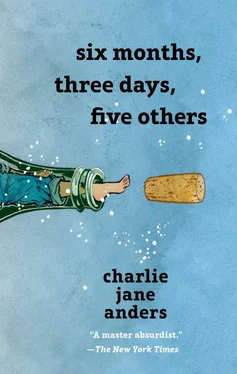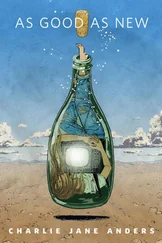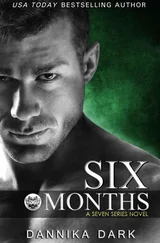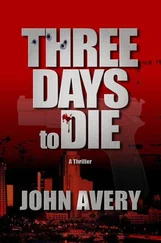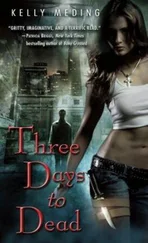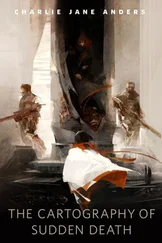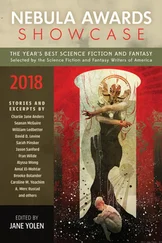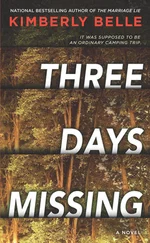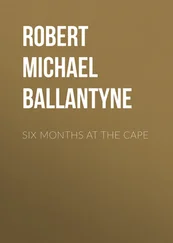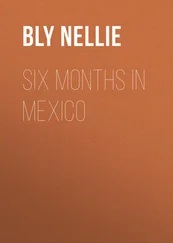Чарли Андерс - Six Months, Three Days, Five Others
Здесь есть возможность читать онлайн «Чарли Андерс - Six Months, Three Days, Five Others» весь текст электронной книги совершенно бесплатно (целиком полную версию без сокращений). В некоторых случаях можно слушать аудио, скачать через торрент в формате fb2 и присутствует краткое содержание. Город: New York, Год выпуска: 2017, ISBN: 2017, Издательство: Tom Doherty Associates, Жанр: Фэнтези, Фантастика и фэнтези, nsf, на английском языке. Описание произведения, (предисловие) а так же отзывы посетителей доступны на портале библиотеки ЛибКат.
- Название:Six Months, Three Days, Five Others
- Автор:
- Издательство:Tom Doherty Associates
- Жанр:
- Год:2017
- Город:New York
- ISBN:978-0-7653-9489-7
- Рейтинг книги:3 / 5. Голосов: 1
-
Избранное:Добавить в избранное
- Отзывы:
-
Ваша оценка:
- 60
- 1
- 2
- 3
- 4
- 5
Six Months, Three Days, Five Others: краткое содержание, описание и аннотация
Предлагаем к чтению аннотацию, описание, краткое содержание или предисловие (зависит от того, что написал сам автор книги «Six Months, Three Days, Five Others»). Если вы не нашли необходимую информацию о книге — напишите в комментариях, мы постараемся отыскать её.
Six Months, Three Days, Five Others — читать онлайн бесплатно полную книгу (весь текст) целиком
Ниже представлен текст книги, разбитый по страницам. Система сохранения места последней прочитанной страницы, позволяет с удобством читать онлайн бесплатно книгу «Six Months, Three Days, Five Others», без необходимости каждый раз заново искать на чём Вы остановились. Поставьте закладку, и сможете в любой момент перейти на страницу, на которой закончили чтение.
Интервал:
Закладка:
“That’s a very skewed construction of events. If the white sludge was caused by a wish that somebody made—and I’m not saying it was—then it’s not my fault. It’s the fault of the wisher.”
“Okay,” Marisol said. Richard drew to attention, thinking she was finally ready to make her first wish. Instead, she said, “I need to think,” and put the cork back in the bottle.
Marisol watched a season and a half of I Dream of Jeannie , which did not help at all. She ate some delicious beef stroganoff and drank more vodka. She slept and watched TV and slept and drank coffee and ate an omelet. She had no circadian rhythm to speak of anymore.
She had four wishes, and the overwhelming likelihood was that she would foul them up, and maybe next time there wouldn’t be one person left alive to find the bottle and fix her mistake.
This was pretty much exactly like trying to cure a patient, Marisol realized. You give someone a medicine which fixes their disease but causes deadly side effects. Or reduces the patient’s resistance to other infections. You didn’t just want to get rid of one pathogen, you wanted to help the patient reach homeostasis again. Except that the world was an infinitely more complex system than a single human being. And then again, making a big wish was like writing a play, with the entire human race as players. Bleh.
She could wish that the bioengineered fungus had never dissolved the world, but then she would be faced with whatever climate disaster the fungus had prevented. She could make a blanket wish that the world would be safe from global disasters for the next thousand years—and maybe unleash a millennium of stagnation. Or worse, depending on the slippery definition of “safe.”
She guessed that wishing for a thousand wishes wouldn’t work—in fact, that kind of shenanigans might be how Richard Wolf wound up where he was now.
The media server in the panic room had a bazillion movies and TV episodes about the monkey paw, the wishing ring, the magic fountain, the Faustian bargain, the djinn, the vengeance-demon, and so on. So she had plenty of time to soak up the accumulated wisdom of the human race on the topic of making wishes, which amounted to a pile of clichés. Maybe she would have done more good as a playwright than as a doctor, after all—clichés were like plaque in the arteries of the imagination, they clogged the sense of what was possible. Maybe if enough people had worked to demolish clichés, the world wouldn’t have ended.
Marisol and Richard sat and watched The Facts of Life together. Richard kept complaining and saying things like, “This is worse than being trapped inside a bottle.” But he also seemed to enjoy complaining about it.
“This show kept me marginally sane when I was the only person on Earth,” Marisol said. “I still can’t wrap my mind around what happened to the human race. So, you are conscious of the passage of time when you’re inside the bottle.” She was very careful to avoid phrasing anything as a question.
“It’s very strange,” Richard said. “When I’m in the bottle, it’s like I’m in a sensory deprivation tank, except not particularly warm. I float, with no sense of who or where I am, but meanwhile another part of me is getting flashes of awareness of the world. But I can’t control them. I might be hyperaware of one ant carrying a single crumb up a stem of grass, for an eternity, or I might just have a vague sense of clouds over the ocean, or some old woman’s aches and pains. It’s like hyper-lucid dreaming, sort of.”
“Shush,” said Marisol. “This is the good part—Jo is about to lay some Brooklyn wisdom on these spoiled rich girls.”
The episode ended, and another episode started right away. You take the good, you take the bad. Richard groaned loudly. “So what’s your plan, if I may ask? You’re just going to sit here and watch television for another few years?” He snorted.
“I have no reason to hurry,” Marisol said. “I can spend a decade coming up with the perfect wishes. I have tons of frozen dinners.”
At last, she took pity on Richard and found a stash of PBS American Playhouse episodes on the media server, plus other random theatre stuff. Richard really liked Caryl Churchill, but didn’t care for Alan Ayckbourn. He hated Wendy Wasserstein. Eventually, she put him back in his bottle again.
Marisol started writing down possible draft wishes in one of the three blank journals that she’d found in a drawer. (Burton had probably expected to record his thoughts, if any, for posterity.) And then she started writing a brand-new play, instead. The first time she’d even tried, in a few years.
Her play was about a man—her protagonists were always men—who moves to the big city to become a librarian, and winds up working for a strange old lady, tending her collection of dried-out leaves from every kind of tree in the world. Pedro is so shy, he can’t even speak to more than two people, but so beautiful that everybody wants him to be a fashion model. He pays an optometrist to put drops in his eyes, so he won’t see the people photographing and lighting him when he models. She had no clue how this play was going to end, but she felt a responsibility to finish it. That’s what Mrs. Garrett would expect.
She was still stung by the idea that her prize-winning play was dumb, or worse yet kind of misogynistic. She wished she had an actual copy of that play, so she could show it to Richard and he would realize her true genius. But she didn’t wish that out loud, of course. And maybe this was the kick in the ass she needed to write a better play. A play that made sense of some of this mess.
“I’ve figured it out,” she told Richard the next time she opened his bottle. “I’ve figured out what happened those other times. Someone finds your bottle after the apocalypse, and they get three wishes. So the first wish is to bring the world back and reverse the destruction. The second wish is to make sure it doesn’t happen again. But then they still have one wish left. And that’s the one where they do something stupid and selfish, like wishing for irresistible sex appeal.”
“Or perfect hair,” said Richard Wolf, doing his patented eye-roll and air-swat.
“Or unlimited wealth. Or fame.”
“Or everlasting youth and beauty. Or the perfect lasagna recipe.”
“They probably figured they deserved it,” Marisol stared at the pages of scribbles in her hands. One set of diagrams mapping out her new, as-yet-unnamed play. A second set of diagrams trying to plan out the wish-making process, act by act. Her own scent clung to every surface in the panic room, the recirculated and purified air smelled like the inside of her own mouth. “I mean, they saved the world, right? So they’ve earned fame or sex or parties. Except I bet that’s where it all goes wrong.”
“That’s an interesting theory,” said Wolf, arms folded and head tilted to one side, like he was physically restraining himself from expressing an opinion.
Marisol threw out almost every part of her new play, except the part about her main character needing to be temporarily vision-impaired so he can model. That part seemed to speak to her, once she cleared away the clutter about the old woman and the leaves and stuff. Pedro stands, nearly nude, in a room full of people doing makeup and lighting and photography and catering and they’re all blurs to him. And he falls in love with one woman, but he only knows her voice, not her face. And he’s afraid to ruin it by learning her name, or seeing what she looks like.
By now, Marisol had confused the two processes in her mind. She kept thinking she would know what to wish for, as soon as she finished writing her play. She labored over the first scene for a week before she had the nerve to show it to Richard, and he kept narrowing his eyes and breathing loudly through his nose as he read it. But then he said it was actually a promising start, actually not terrible at all.
Читать дальшеИнтервал:
Закладка:
Похожие книги на «Six Months, Three Days, Five Others»
Представляем Вашему вниманию похожие книги на «Six Months, Three Days, Five Others» списком для выбора. Мы отобрали схожую по названию и смыслу литературу в надежде предоставить читателям больше вариантов отыскать новые, интересные, ещё непрочитанные произведения.
Обсуждение, отзывы о книге «Six Months, Three Days, Five Others» и просто собственные мнения читателей. Оставьте ваши комментарии, напишите, что Вы думаете о произведении, его смысле или главных героях. Укажите что конкретно понравилось, а что нет, и почему Вы так считаете.
